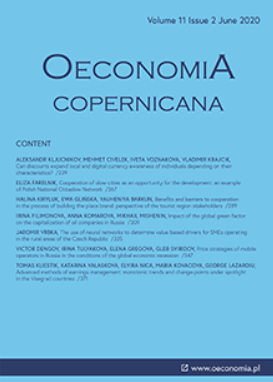Circular economy as assistance for sustainable development in OECD countries
Circular economy as assistance for sustainable development in OECD countries
Author(s): Viktorija Skvarciany, Indrė Lapinskaitė, Gintare VolskyteSubject(s): Business Economy / Management, Energy and Environmental Studies, Economic policy, Human Ecology, Economic development
Published by: Instytut Badań Gospodarczych
Keywords: circular economy; sustainability; sustainable development goals; OECD countries;
Summary/Abstract: Research background: Circular economy is of great importance, as it plays a vital role in ensuring the reuse of waste created and, therefore, reduces the waste of limited resources, which is the primary goal of the general economic concept. In line with the circular economy, sustainable development gains great attention, as the United Nations announced the sustainable development goals that should be reached by 2030. Hence, the current paper aims at examining whether the circular economy could be treated as an effective assistance tool for sustainable development of OECD countries. Purpose of the article: The paper aims to investigate whether the circular economy could serve as an assistance tool for sustainable development and, therefore, seeks to determine if the circular economy could directly impact a country’s sustainable development. Methods: First, the countries chosen were prioritised using the Analytic Hierarchy Process (AHP) and the Evaluation Based on Distance from Average Solution (EDAS) methodologies. AHP method was used for weight assignment to the circular economy indicators that were further used for OECD countries’ prioritisation procedure for which multi-criteria decision-making method EDAS was employed. Second, to reveal a link between the circular economy ranking results and sustainable development, a comparative analysis was done. Third, the impact of the country’s circular economy on sustainable development was evaluated using the fixed-effect regression model on four years of panel data from 2016 to 2019 for the sample of 32 OECD countries. Findings & value-added: The comparative analysis of the circular economy’s prioritisation results and Sustainable Development Goals Index (SDGI) ranking showed 20 out of 32 matches, assuming a link between the circular economy and sustainable development could be made. The fixed-effect regression equation results demonstrate that the unemployment rate, poverty rate, air pollution exposure, and CO2 emission per capita negatively influence sustainable development. In contrast, indicators such as gross domestic expenditure on R&D, renewable energy, number of passenger cars in use, and households with Internet access positively impact SDGI. The hypothesis that the circular economy is seen as an assistance for sustainable development and directly affects a country’s sustainability was approved.
Journal: Oeconomia Copernicana
- Issue Year: 12/2021
- Issue No: 1
- Page Range: 11-34
- Page Count: 24
- Language: English

